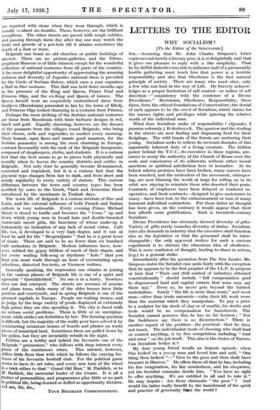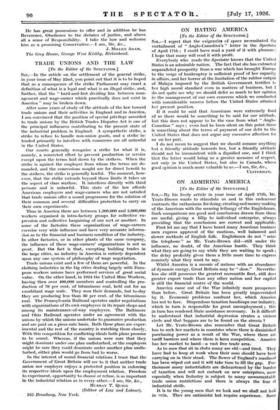LETTERS TO THE EDITOR
WHY SOCIALISM ?
[To the Editor of the SPEaraTon.]
Sm,—Assuming that Mr. John Charles Simpson's letter expresses not merely a literary pose, it is so delightfully naif that it gives one pleasure to reply with a like simplicity. That he by skilful dialectics was able to influence half of a presumably hostile gathering must teach him that power is a terrible responsibility and also that Obedience is the first natural principle of society. There are many who must obey, only a few who can lead in the way of Life. He bravely acknow- ledges as a proper limitation of self control—or rather of self direction—" consistency with the existence of a Divine Providence." Reverence, Obedience, Responsibility, these three, form the ethical foundations of Conservatism ; the denial of each appears to be the creed of Socialism, which claims for the masses rights and privileges while ignoring the relative worth of the individual man.
What does Socialism make of responsibility ? (Spondeo, I promise solemnly.) It destroys it. The sparrow and the starling in the streets are now finding and dispensing food for their fledglings. The wild beasts of the forests are nurturing their young. Socialism seeks to relieve its recreant.disciples of this apparently inherent duty of a living creature. The hidden power behind the T.U.C., its executive in these regions, pre- sumes to usurp the authority of the Church of Rome over the souls and consciences of its adherents without either moral sanctions or spiritual satisfaction here or hereafter. At its behest solemn promises have been broken, many careers have been wrecked, and the misleaders of the movement, whimper- ing, are now blaming the world at large for rolling on in its orbit nor staying to reinstate those who deserted their posts. Contracts of employers have been delayed or rendered in- operative, and fresh contracts—designed to give sustenance to many—have been lost, to the embarrassment or ruin of many innocent individual contractors. For those latter no thought has been given, on the contrary it would appear that their loss affords some gratification. Such is twentieth-century Socialism.
Divine Providence has obviously decreed diversity of gifts. Variety of gifts surely connotes diversity of duties. Socialism inter alio demands in industry that the executive shall function also as the legislative or that the personnel shall be inter- changeable ; the only apparent motive for such a curious experiment is to obscure the obnoxious idea of obedience. This is mere confusion of thought, leading to chaos in action, (e.g.) to a general strike.
Immediately after his quotation from The New Leader, Mr. Simpson states the Socialist case quite fairly with the exception that he appears to be the first prophet of the I.L.P. to propose or hint that " Their end (full control of industry) obtained constitutionally " should include " full compensation paid to dispossessed land and capital owners that none may say them nay." Even so, he never gets beyond the baldest materialism. Surely " the life is more than meat," and most men—other than trade unionists—value their life work more than the material which they manipulate. To pay a price to a sculptor for his stock of clay or of marble, his studio and tools would be no compensation for banishment. The Socialist cannot perceive this, he has no far horizon ; " For the Sadducees say there is no Resurrection." There is another aspect of the problem—the practical—that he does not touch. The individualist mode of choosing who shall lead or control anything, is by free competition including " trial and error " on the job itself. This also is the choice of Nature. Can Socialism better it ?
My dear young friend recalls an historic episode, when One looked on a yo‘Nug man and loved him and said, " One thing thou lackest "—" Give to the poor and thou shalt have treasure in Heaven." He offers them all that he has, including his fine imagination, his fair mindedness, and his eloquence, yet his Socialist comrades deride him. " You have no right to offer anything. We are entitled to all and to take it." He may inquire : Are those claimants " the poor " ? And would the latter really benefit by the banishment of the spirit and practice of generosity fauna the world ?
He has great possessions to offer and in addition he has Reverence, Obedience to the dictates of justice, and above all a sense of Responsibility. I take the lure and welcome him as a promising Conservative.—I am, Sir, &c., J. MILLEN' ADAM.
The Grey House, Grange West Kirkby, Birkenhead.











































 Previous page
Previous page